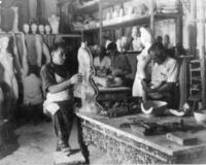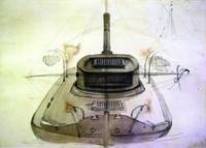Documentary collections of Brazil inscribed in the Memory of World Register
List of documentary heritage submitted by Brazil and inscribed in the Memory of the World Register.
Antonio Carlos Gomes: composer of two worlds

© Brazil, Italy, Carlo Ferrario. Watercolour. Scenery for the opera Il Guarany. 1870. Teatro alla Scala.
Documentary heritage submitted by Brazil and Italy and recommended for inclusion in the Memory of the World Register in 2017.
Antonio Carlos Gomes: composer of two worlds gathers together documents produced by the composer, which have never been presented complete, shading light on his life and work. Carlos Gomes created works, mainly in the operatic field, starting with the world première of his third opera – Il Guarany – at the Teatro alla Scala – in Milan on March 18, 1870. From then onwards, he searched for originality in music which, until then, was still dependent and influenced by Italian opera. This documentation is a source for study of music of the second half of the XIX Century.
Collection Educator Paulo Freire

© Ana Maria Araújo Freire, Instituto Paulo Freire. Paulo Freire in a seminar with Professor Enzo Morgagni in Venice in January 1989
Documentary heritage submitted by Brazil and recommended for inclusion in the Memory of the World Register in 2017.
Paulo Freire was a Brazilian educator, his ideas originated from experiences of Brazilian northeast, as teacher and social activist, which made him creative and genuine expressions of critical pedagogy, which he himself created. His thoughts influenced different areas of knowledge and introduced the concept of Popular Education worldwide. He offered knowledge from an ethical-critical-political-educational perspective, and thus conceived an adult literacy methodology, being named Patron of the Brazilian Education by law 12.612 of 13 april 2012. Ana Maria Araujo Freire and Paulo Freire Institute keep in custody these documents. It is a large collection relevant to popular education, youth and adult literacy, social movements, political education, ecopedagogy.
Nise da Silveira Personal Archive

© Sociedade Amigos do Museu de Imagens do Inconsciente, Modeling studio, created by Nise da Silveira at the Psychiatric Center in 1946
Documentary heritage submitted by Brazil and recommended for inclusion in the Memory of the World Register in 2017.
The Nise da Silveira Personal Archive is a collection of documents consisting of approximately 8,000 items, including textual, iconographic, bibliographic and press documents produced and gathered during the course of psychiatrist Nise da Silveira’s professional and personal activities.
Nise da Silveira carried out her professional activity mainly at the National Psychiatric Center, where she founded the Occupational Therapy Section, which in 1952 gave rise to the Museu de Imagens do Inconsciente [Museum of Images of the Unconscious], today’s largest museum of its kind in the world. She introduces occupational therapy and activities of artistic expression in the treatment of psychiatric disturbances and became a pioneer in Brazil in the use of animals in therapy. Nise da Silveira corresponded with Swiss psychiatrist Carl G. Jung, and was responsible for the introduction of Jungian psychology in Brazil. She also created Casa das Palmeiras, a rehabilitation clinic, on an outpatient basis, for patients discharged from psychiatric institutions, the first of its kind in Brazil.
The War of the Triple Alliance Iconographic and cartographic presentations

© Brazilian Navy's Historical Heritage and Documentation
Documentary heritage submitted by Brazil and Uruguay and recommended for inclusion in the Memory of the World Register in 2015.
The War of the Triple Alliance left indelible marks on the history of South America. One of the bloodiest conflicts of the XIX Century as well as one of the longest-lasting in the Americas, it served to redefine national frontiers in the River Plate area. Also to leave its mark on the history of the countries involved: Paraguay, Brazil, Argentina and Uruguay.
Architectural Archive of Oscar Niemeyer
Documentary heritage submitted by Brazil and recommended for inclusion in the Memory of the World Register in 2013.
The collection consists of 8927 documents, with boards of sketches sets, boards of architectural albums and boards of technical drawings which form a valuable record of the work of an artist who marked the international architecture of the twentieth century. In addition to primary research sources, many of these documents are true works of art. The sketches and albums are original documents, rare and almost entirely unique. They not only bring traces of free curves and poetic that marked the work of Niemeyer, but also reveal the architect's working method.
- Year of submission: 2012
- Year of inscription: 2013
- Country: Brazil
- Access to the collection: Oscar Niemeyer Foundation (in Portuguese)
Documents regarding the Emperor D. Pedro II's journeys in Brazil and abroad

© Museu Imperial
Documents regarding the Emperor d. Pedro II's journeys in Brazil and abroad - Project logotype.
Documentary heritage submitted by Brazil and recommended for inclusion in the Memory of the World Register in 2013.
Journeys of the Emperor between 1840 and 1913. D. Pedro II undertook various journeys during the 49 years of his reign, through Brazil and four continents, getting to know new territories and other cultures. The documents are prime sources written and received by d. Pedro II during a period of profound historic changes that relate to cultural referentials of modernity, from the perspective of a privileged observer - the Emperor of Brazil - and his interlocutors, mostly intellectuals. They reveal aspects of the thinking, the scientific discoveries, the cultural diversity and the political passions, as well as analyzing diplomatic relations between Brazil and countries from different continents.
- Year of submission: 2012
- Year of inscription: 2013
- Country: Brazil
- Access to the collection: Museu Imperial website (in Portuguese)
Dutch West India Company (Westindische Compagnie) Archives
Documentary heritage submitted by the Netherlands, Brazil, Ghana, Guyana, Netherlands Antilles, Suriname, United Kingdom and United States of America and recommended for inclusion in the Memory of the World Register in 2011.
The DWIC archives are primary resources for researching the history of the European expansion into West Africa and America. The records concern various themes such as commerce and slave trade, warfare, early modern diplomacy, plantation cultures and daily life issues. Moreover the DWIC archives contain information on the history of the regions where the DWIC founded colonies and trading posts. In many instances there is no other written information available for that period. The DWIC archives comprise of unique information that is important for the history of Brazil, Ghana, Guyana, the Netherlands, the Netherlands Antilles, Suriname and the United States and therefore have a great international value.
- Year of submission: 2010
- Year of inscription: 2011
- Countries: the Netherlands, Brazil, Ghana, Guyana, Netherlands Antilles, Suriname, United Kingdom and United States of America
- Access to the collection: New York Public Library Archives & Manuscripts
Network of information and counter information on the military regime in Brazil (1964-1985)

© Arquivo Nacional
Syntheses for classes of Escola Nacional de Informações (EsNI)
Documentary heritage submitted by Brazil and recommended for inclusion in the Memory of the World Register in 2011.
This unique and irreplaceable set of 17 fonds is essential for the construction of the history of exception regimes in Latin America in the second half of the 20th century and for the protection of human rights. It is an indispensable source for knowledge of military government policies and actions. Brazilian historiography of that period, for so long restricted to reports of militants in clandestine organizations and private archives, can now be enhanced by research based on new documents, objects and approaches. It covers information produced by the network of information and counter information on the military regime in Brazil (1964-1985), which today are under custodianship of several public archival institutions in the country. It is linked to other Latin America countries that went through exception regimes, such as Argentina, Chile, Paraguay and Uruguay.
- Year of submission: 2010
- Year of inscription : 2011
- Country: Brazil
- Access to the collection: Arquivo Nacional (in Portuguese)
The Emperor's collection: foreign and Brazilian photography in the XIX century
Documentary heritage submitted by Brazil and recommended for inclusion in the Memory of the World Register in 2003.
This is a unique collection of nineteenth-century photographs, assembled by one individual throughout his lifetime and deposited in a national library where it is kept and every effort is being made to preserve it. It is the largest collection of photographs in Latin America: an accurate portrait of the nineteenth century, reflecting customs, intellectual and industrial developments at the time it was put together. The collection has remained intact throughout its existence. It is the Thereza Christina Maria photograph collection: 21,742 photos left to the National Library of Brazil by Emperor Pedro II in 1891. The collection is made up of photographs of different types and formats.
It took some 50 years to build a genuine contribution to the study of nineteenth-century customs and life in several parts of the world. With regard to the history of photography the collection includes works by the first photographers in the world. In this respect, its originality is priceless.
The collection is housed in the National Library of Brazil and forms part of the history of the Brazilian people, whose changing circumstances throughout the nineteenth century it reflects.
Its unique historical value has been recognized through the major exhibitions of photographs from the collection held in Lisbon, Porto and Buenos Aires. These exhibitions have had a tremendous effect; other countries including France and the United States have already expressed their interest in the collection and, in particular, the prospect of hosting it.
- Year of submission: 2003
- Year of inscription: 2003
- Country: Brazil
- Access to the colletion: Collection D. Thereza Christina Maria (in Portuguese)




